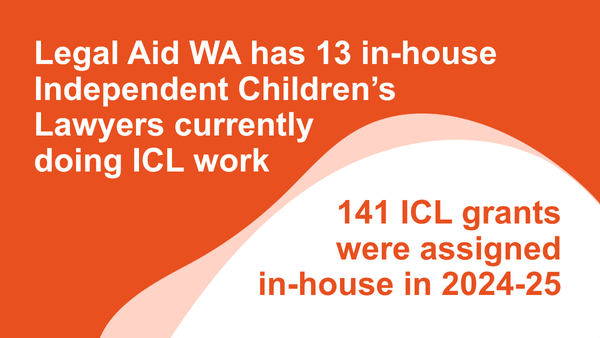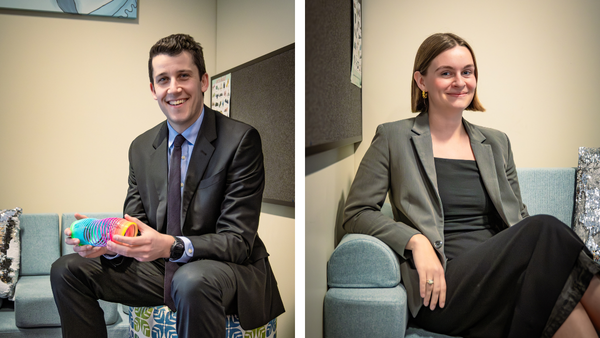An Independent Children’s Lawyer (ICL) is generally appointed in Family Court cases that involve allegations of serious risks such as family violence, mental health, or drug and alcohol misuse or in cases that involve complex issues. An ICL does not act for either parent and is appointed to act in the best interests of the children. The ICL’s role includes:
 gathering information to assist the court to make an informed decision about living arrangements for the children that are in their best interests,
gathering information to assist the court to make an informed decision about living arrangements for the children that are in their best interests,- ensuring the children have an opportunity to express their views and wishes, and to ask any questions they may have about the court process or their care arrangements,
- acting as an intermediary between the parties to try to help them negotiate an agreement in relation to the care of their children, and
- forming an independent view, and informing the court of that view, as to the children’s best interests based on the evidence before the court.
Case Study 1:
An ICL was appointed on a matter where two children were adamant they did not want to spend time with one of their parents, after witnessing several horrific family violence incidents between them. The children were petrified of this parent and had difficulty when their name was used in discussion with them. The parent who had committed the family violence was applying to spend time with the children.
After affording the children the opportunity to express their views, and ensuring they were linked in with appropriate mental health supports, the matter was resolved in accordance with the children’s views; namely that they have no contact with this parent.
Case Study 2:
The parents of two children had been embroiled in a very high conflict parenting matter where allegations of family violence, physical abuse of the children, and emotional abuse had been made. Previously, the parents had agreed to final Court Orders which allowed for the children to spend substantial time with each of them.
Shortly after the matter finalised, there was an altercation at a handover, and one parent applied to reopen proceedings. Given the allegations, the court appointed an ICL, and the ICL made the decision to meet with the children at a very early stage. Both children spoke positively about their parents and expressed that they wanted to continue spending time with each of them as per the existing arrangements. After informing the parents of the children’s views, the new parenting application was not pursued.
The children were able to focus on enjoying their relationship with both parents and their schooling, while also being linked in with appropriate counselling supports to help them navigate their feelings around their parents’ separation and conflict.
Case Study 3:
An ICL was appointed in a matter where one parent was seeking a change in residence for a child with complex needs. The matter was very high conflict, with both parents having filed several affidavits over a very short period.
The ICL worked with the parties to move away from the litigation process and organised for them to engage in a period of brief therapeutic work with our Child and Family Experts. This allowed the parents to focus on their communication and co-parenting skills outside of the court process. The therapeutic work ultimately resulted in the change of residence application being withdrawn, and the parties engaging in constructive dialogue about how they could better support their child across their households. They later agreed to attend a Family Dispute Resolution Conference to discuss long term arrangements for the child, rather than proceeding to a trial.
A day in the life of an Independent Children's Lawyer
What does a day in the life of an ICL look like?
Each day is quite different. It might involve attending a hearing or conference at the court, or a Family Dispute Resolution Conference here at Legal Aid WA. It also could involve meeting with children. Most of these meetings take place in the office in our child interview room, but we also travel to meet with children to try to reduce the impact on them, especially if it means missing less school. We will also travel to regional areas so we can meet the children we are representing in person. Generally, our day always involves some file work or inspecting documents at the court. Every day is different, but you can almost guarantee our week will be a mix of the above.
Why did you want to be an ICL?
Dylan. I’ve always enjoyed engaging with children and giving them an opportunity to put forward their voice regarding matters that impact them. I really enjoy meeting with the children as I think it gives you a real sense of what is impacting them, and helps you develop a plan for how you might help improve their lives. Working as an Independent Children’s Lawyer allows me to use my legal skills while also advocating for children’s needs.
Caitlin. As a graduate solicitor I was lucky enough to work in our East Kimberley office where I assisted juvenile clients navigating the criminal justice system. Through this, I learned the importance of ensuring these children’s circumstances and perspectives were truly understood by legal decision makers. I saw firsthand how legal representation can shape outcomes and impact life trajectories, especially when care is taken to address safety concerns for children at home.
Being an ICL seemed like the perfect way I could expand on this experience, while pursuing my passion for family law.
Why is it important that Legal Aid WA has ICLs?
Dylan. In high-risk matters, the children’s best interests can often become lost in the high conflict and allegation heavy litigation. An organised and well-informed ICL can be vital to ensuring a child’s needs are the focus of the parents’ (and court’s) decision making.
Sometimes a little thing like sending parents a letter about meeting with their child, where their child has said they just want Mum and Dad to get along, can be powerful in bringing about a much more positive environment for the child.
Caitlin. An ICL can really help to change the trajectory of a parenting matter and shift the focus of the proceedings back to the children’s best interests. Sadly, we’re not seeing a decrease in high-risk matters, and issues such as family violence continue to impact children and families. The provision of ICLs by Legal Aid WA ensures that these issues are addressed in a way that puts children’s best interests at the forefront of decision making.
What are some of the challenges?
Caitlin. It’s quite common for ICLs to be unpopular with one if not both parents. The role requires the ICL to adopt a position they consider in the child’s best interests and advocate for that position to the court. This can often be at odds with the parents’ express position (and sometimes with the child’s express view). Adopting a position, while maintaining neutrality and trying to facilitate an agreement between parties can be a difficult balancing act, as parties will often assume that you are on the other parent’s side. Given the high-risk matters that ICLs are appointed for, the allegations and content can also be confronting, particularly where it involves significant abuse and/or trauma to children.
What motivates you in your work?
Dylan. I think separation for anyone can be an extremely difficult time, and for children it can be particularly challenging to navigate. I’m motivated to ensure children are given an opportunity to have their voice heard by the people making decisions about them, while also ensuring the children themselves are aware of how such decisions are made. Ensuring that the Family Court has a full picture of the risk issues surrounding children, can hopefully help ensure children are given the opportunity to develop in a safe and child-focused environment.
